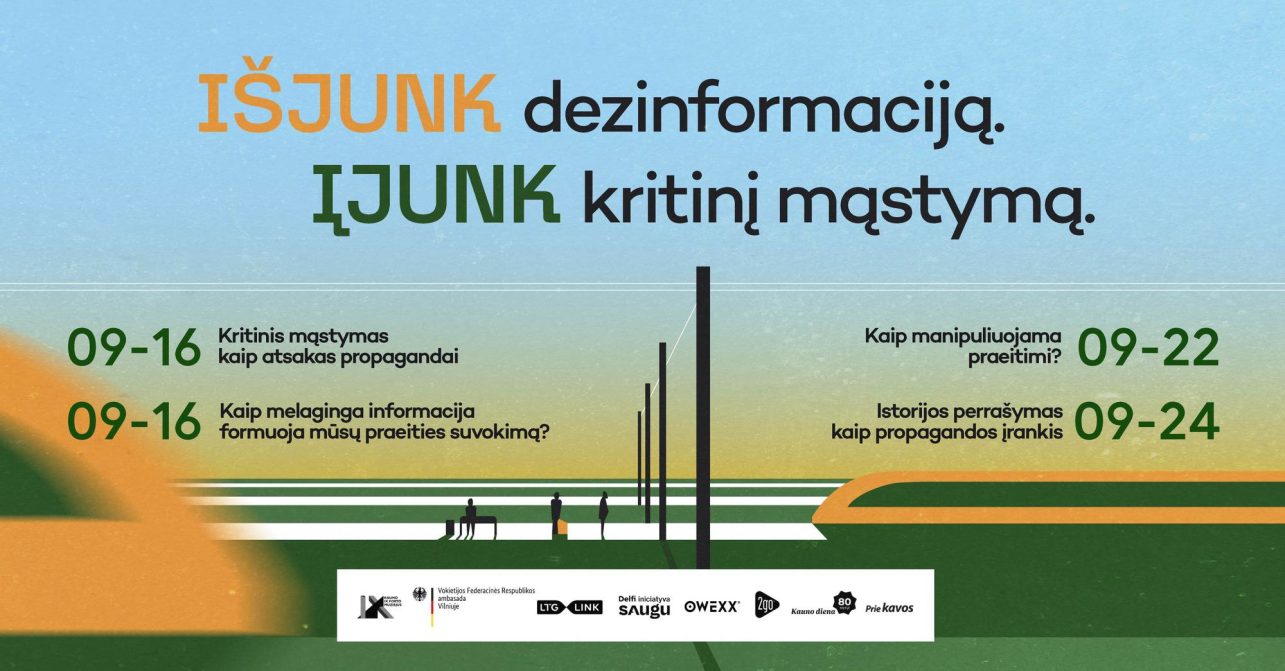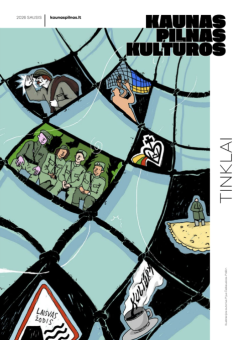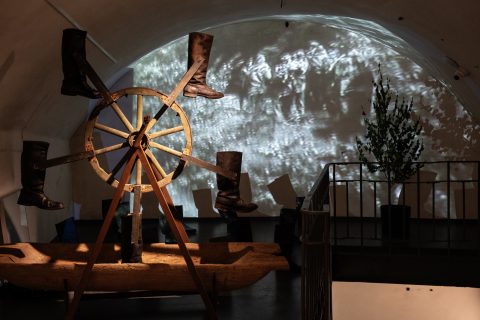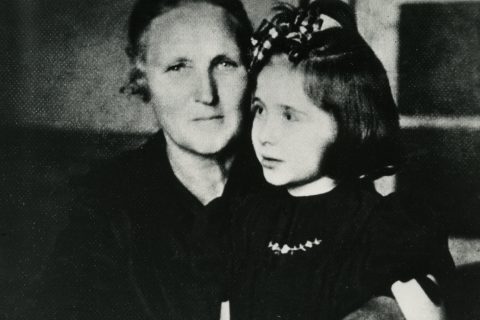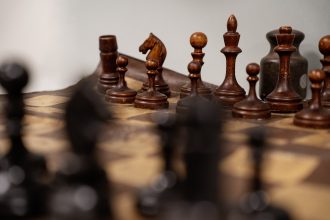Modern society faces a huge flow of information every day, which is often confusing and misleading. At the same time, society faces a serious challenge: to distinguish reliable information from disinformation, which is deliberately spread to mislead and influence opinion or behaviour.
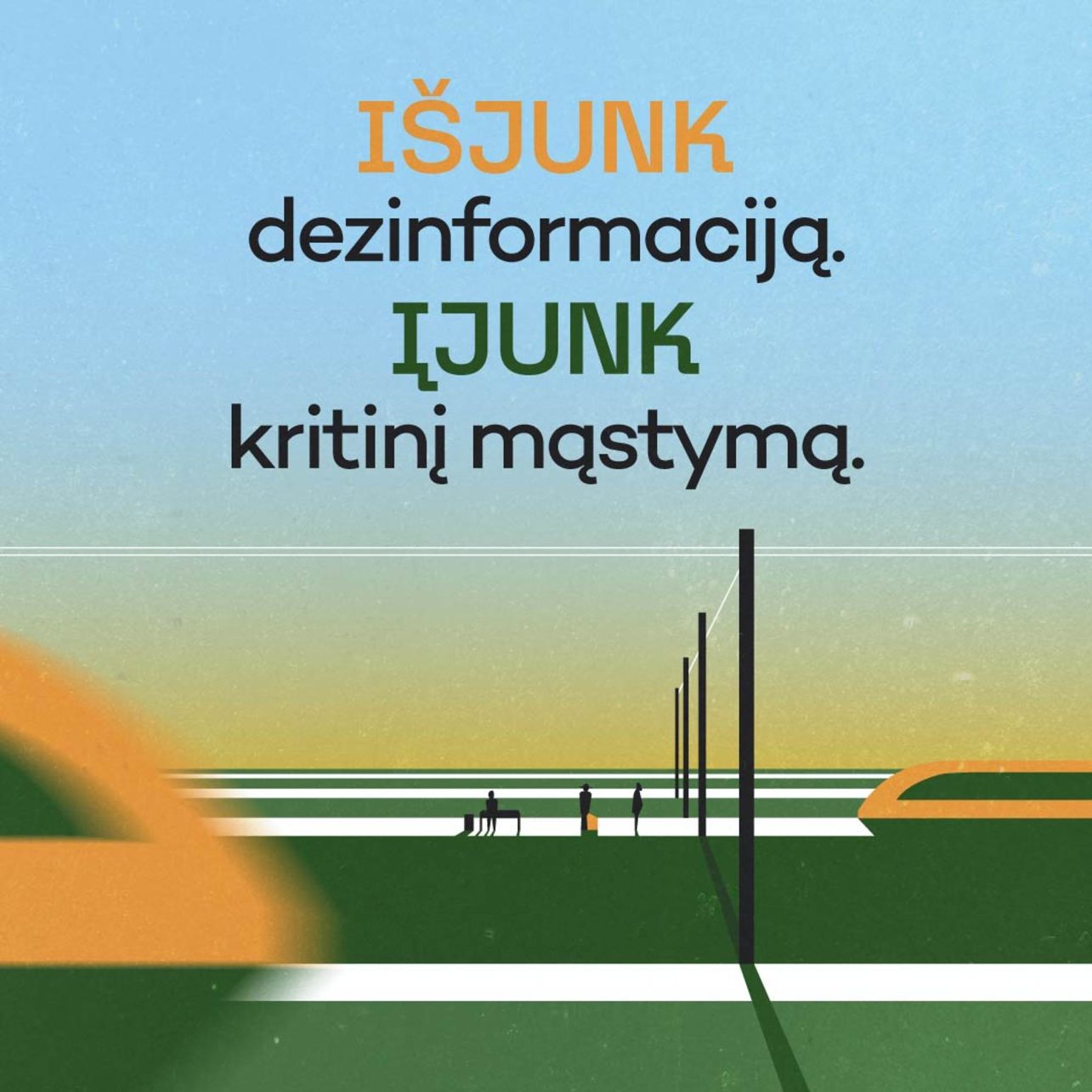
These days, it is important not only to understand what disinformation is, but also why it is spread and to strive to become resistant to its effects. By organizing its activities in a focused and thoughtful manner, a museum can help society develop resilience and contribute to overcoming the challenges of disinformation.
Why critical thinking?
Every day, fake news, fabricated stories and distorted facts spread, deliberately seeking to manipulate public opinion. Although disinformation usually makes up only a small part of the average person’s daily information intake, some people are not immune to malicious manipulation and can be easily influenced. This is because disinformation is often not very easy to spot. It is most often spread by hostile states or groups seeking to divide society and cast doubt on Lithuania’s statehood.
Today, the threat to statehood is not only the danger of war; it is also dangerous if society loses the will and ability to resist, which is why it is particularly important to foster civic awareness. One of the most important skills in this respect is critical thinking. It is the ability to evaluate information and distinguish between what is true and factual and what is false or just someone’s unfounded opinion. People who can think critically cannot be easily manipulated. They evaluate all available information, selecting and critically analyzing it, looking for arguments for and against, thus forming their own opinion rather than accepting an imposed one. A large number of critically thinking people not only increases society’s resistance to disinformation, but is also an essential component of a democratic society.
Propaganda targets sensitive historical events and dates
The European region, including Lithuania, is threatened by aggressive Kremlin propaganda and attempts to destabilize statehood processes. This propaganda often targets several areas, but in this context, historical events are most important to us. The Kremlin uses them as a tool for its political goals.
Distortion of the Holocaust and anti-Semitism
In 2024, the US State Department agency GEC, responsible for combating foreign disinformation, presented a meaningful analysis in its report on the Kremlin’s use of anti-Semitism to spread disinformation and propaganda. According to the GEC, for more than a century, the Russian government has used anti-Semitism to discredit, divide and weaken its perceived opponents. In order to fuel anti-Semitism, the Kremlin spreads conspiracy theories through all possible channels. The aim is to mislead the world about the war Russia has started against Ukraine. This tactic is based on an old tradition of using anti-Semitism to cause division in society. Disinformation is spread about Russia fighting against alleged Ukrainian and Western Nazis. The Kremlin portrays Ukraine and its supporters, including Lithuania, as Nazis, anti-Semites, and “Russophobes,” demonizing the President of Ukraine, Volodymyr Zelensky, who is of Jewish descent. It also equates him with the most terrible Nazis and manipulates a distorted history of the Holocaust.
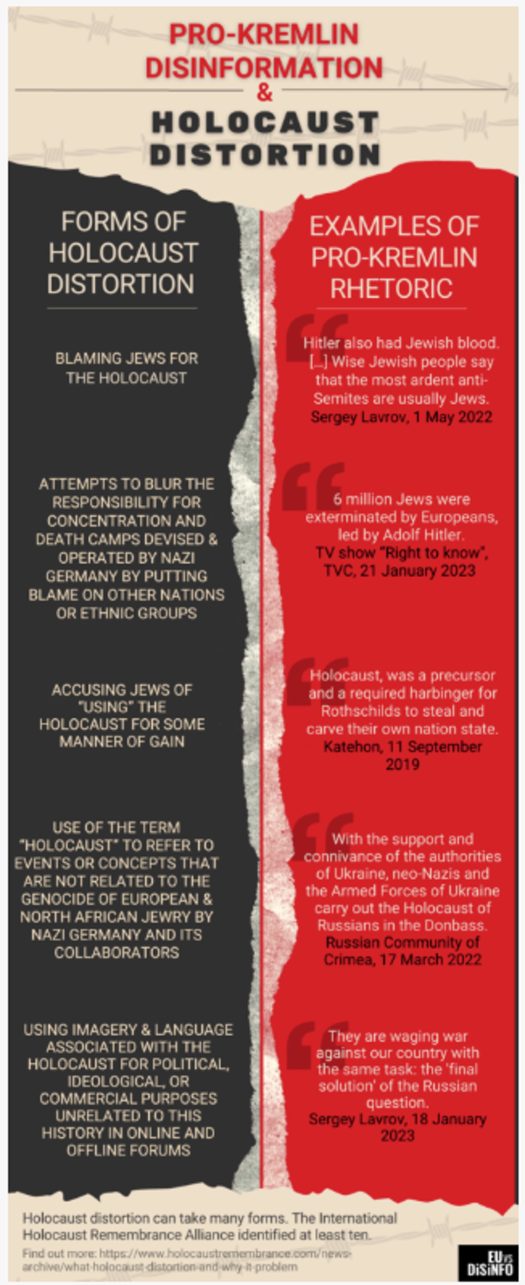
The Kremlin uses its propaganda to exploit centuries-old prejudices against Jews for its own interests. The Tsarist Russian Empire, the Soviet Union and now the Kremlin regime are trying to discredit, divide and weaken their perceived opponents by falsely accusing them of Nazism, attempting to sow discord in society and spreading conspiracy theories about the Jewish people. It is also important to note that Kremlin propagandists are trying to deflect Western criticism of Russia’s distortion of the Holocaust by using a propaganda technique known as “whataboutism.” This involves the Kremlin simultaneously falsely accusing its critics of malicious activity, claiming that the West is spreading false information.
The distortion of the Holocaust and the dissemination of false information by Russia become particularly active when the international community commemorates important dates. For example, January 27 is a day of remembrance for the victims of the Jewish people, but Kremlin propaganda uses this day to spread its narratives about the alleged dangers of Nazism, anti-Semitism and “Russophobia.” For instance, on January 27, 2023, when the world commemorated the International Holocaust Remembrance Day, Russian TV host Vladimir Solovyov, who spreads Kremlin propaganda, shared a post on social media comparing the President of Ukraine, Volodymyr Zelensky, to Hitler.
Another propagandist, Yevgeny Satanovsky, accused Poland on television of repeating Nazi plans from World War II to exterminate all Jews, in order to show the alleged desire to exterminate all Russians. The Russian president himself publicly drew misleading parallels between the “barbaric Nazi plans” to kill Jews and other people and the “crimes” allegedly committed by “neo-Nazis” in contemporary Ukraine. All of this is linked to a deliberately disseminated propaganda narrative that Nazism is being revived in the form of “Russophobia” and is a new form of anti-Semitism; also, Western Europe, including the Baltic states, are the propagators of Nazism.
In 2025, there were also several instances of disinformation commemorating the International Holocaust Remembrance Day. The most speculation surrounded an event in Poland to mark the 80th anniversary of the liberation of the Auschwitz concentration camp. No official Russian delegation was invited to this event, and propagandists took advantage of this by spreading repetitive disinformation narratives accusing the West of “Russophobia,” Nazism and historical revisionism. The traditional “Nazis came to the Nazis” narrative was spread, and unfounded accusations were made that Poland, celebrating the anniversary of the liberation of the largest fascist concentration camp at Auschwitz, did not invite Russia, but invited Ukraine and the leader of the allegedly Nazi regime in Kyiv. In publicising these Russian manipulations, the European External Action Service (EEAS) clearly stated that the Russian delegation was not invited not because of alleged Western “historical revisionism,” but because of the Kremlin’s decision to start the largest and most aggressive military conflict in Europe since the end of World War II.
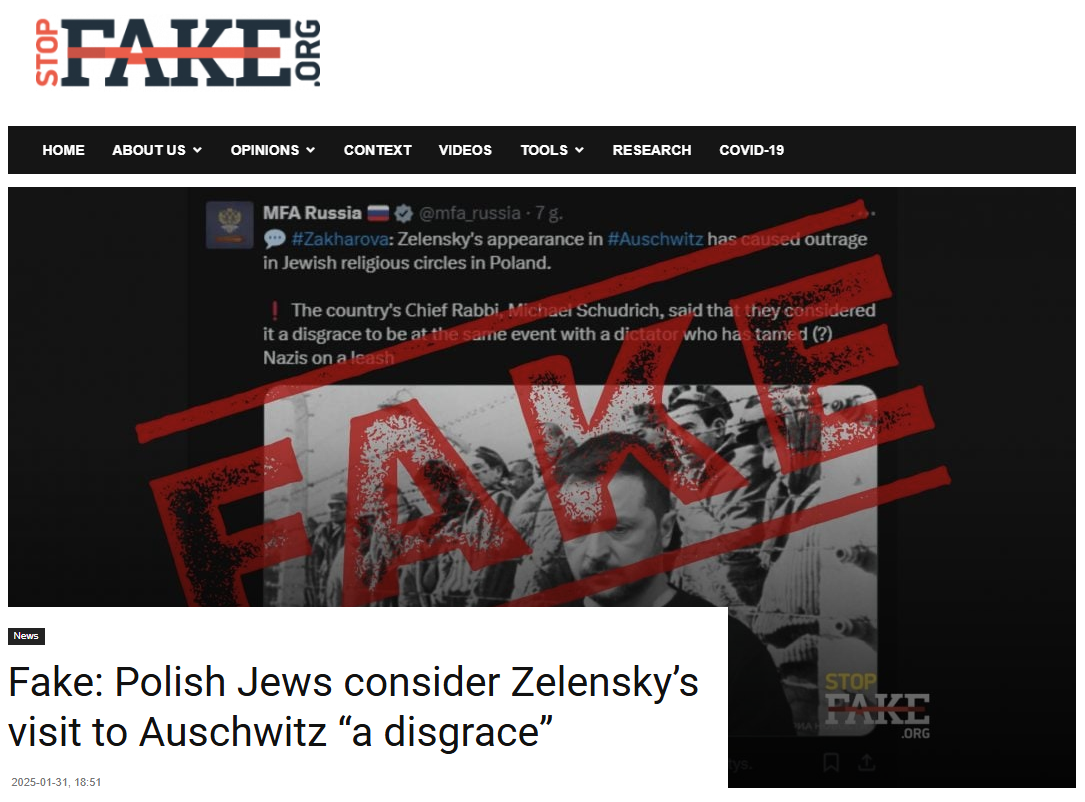
Remembrance day is used for propaganda purposes
On September 23, 2024, Kremlin media spread false information linking Lithuanian partisan commander Adolfas Ramanauskas-Vanagas to mass killings of civilians and unjustifiably accusing him of carrying out the Holocaust. This narrative seeks to undermine not only the authority of important figures in Lithuania, but also the entire armed resistance of Lithuania against the Soviet occupation.
The disinformation and misinformation analysis center Debunk.org conducted a study and analyzed anti-Semitic messages published in pro-Kremlin online media in 2024. The study revealed that accusations of anti-Semitism and glorification of Nazism against Lithuania coincided with important anniversaries. In 2024, narratives shaping a negative image of Lithuania coincided with the International Holocaust Remembrance Day, March 11, the Days of Mourning and Hope and Occupation and Genocide commemorated in June, the anniversary of the June 23 uprising and the National Memorial Day for the Genocide of the Lithuanian Jews commemorated on September 23. According to Debunk.org, by deliberately spreading false narratives, Kremlin propaganda seeks to shape its audience’s opinion that Russia’s neighbours are Nazis and it is necessary to prepare, as propagandists like to say, to “repeat the march to Berlin.”
The European External Action Service (EEAS) concludes that today the line between reality and fiction is blurring as the Kremlin’s political regime distorts history to stir up nationalist fervour among its domestic audience and to incite violence and justify the war in the international arena. The misuse of Nazism as a weapon of information manipulation is not only an insult to historical memory: it is a tool for the destruction of memory.
January 13 and the symbol of a forget-me-not
An important day to every Lithuanian citizen, January 13, which testifies to the pursuit of independence and freedom, is in the focus of propagandists every year. For instance, Delfi Lie Detector announced that analysts from the Civil Resistance Initiative (CRI) had recorded an intensification of Kremlin-friendly media coverage in Lithuania during the first month of 2025. It was noted that the disinformation was aimed at discrediting historical memory. The commemorations of January 13 were criticized as allegedly exaggerated nationalism, and the symbol of a forget-me-not, marking the memory of those who died for freedom, was belittled and devalued in an attempt to diminish the significance of the entire resistance to the Soviet occupation. CRI analyses show that media outlets favourable to the Kremlin targeted the forget-me-not symbol, criticizing it and calling it “an exaggerated sacralization of this occasion.”
In the public sphere, the rhetoric of those spreading the Kremlin’s narrative also includes other absurd interpretations of January 13, such as denying the victims, claiming that the dead were only pretending. Similar propaganda methods can be seen in the coverage of the mass killings of civilians carried out by Russian soldiers in Bucha, Ukraine, in 2022. Denying this war crime, Kremlin propaganda created and spread one false narrative after another, claiming that all the images were staged, that the dead were actually living people pretending to be dead, that the killings were carried out by Ukrainians themselves or that it was a conspiracy against Russia by the West. As noted by propaganda analysis expert Viktor Denisenko, these three contradictory narratives, which are also characteristic of other events, are the result of the information chaos created by the Kremlin’s propaganda system. This way, the information space is flooded with unreliable information so that the information consumer becomes confused and an easy target for manipulation.
By recognizing the danger of such hostile influence and critically evaluating information, one can reduce the harmful effects of manipulation. It is useful to constantly develop critical thinking, as well as to take an interest in and follow verified information. Only in this way, will we be able to avoid getting lost in the bog of information manipulation.
Museums – potential participants in the fight
Museums can become not only guardians of culture, but also active participants in combating the disinformation challenge. They can foster critical thinking and help society recognize information manipulation.
Critical thinking is important, but so is the cultivation of fundamental democratic values. This synergy of competencies and values is the foundation of a resilient and conscious society. As an institution committed to fostering a conscious society that is resistant to external information threats and to preserving historical memory, Kaunas Ninth Fort Museum strives to incorporate these key educational elements into all its cultural activities. This is reflected not only in exhibitions and displays, historical memory events and educational activities and communication, but also in other initiatives. The above-mentioned dates, which are constantly targeted by hostile propaganda, are commemorated each year in one form or another. The museum’s annual events, which attract an increasing number of participants, are exceptional: the “June Garden” dedicated to the Day of Mourning and Hope and the remembrance evening organized for the Day of Remembrance for the Victims of the Genocide of Lithuanian Jews. They bring people together, contribute to raising awareness and prevent important historical memories from fading away.

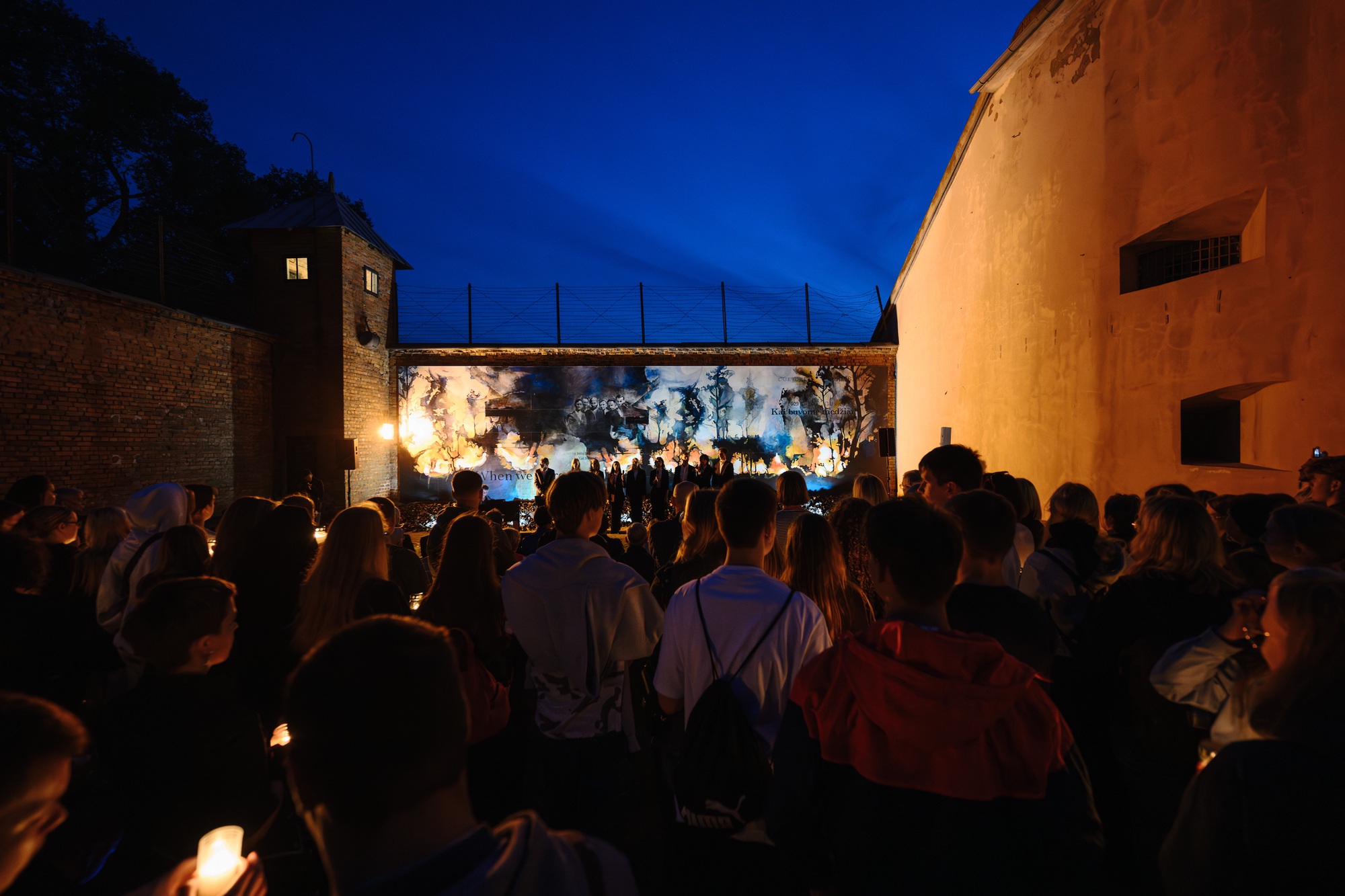
A unique initiative of this year is that Kaunas Ninth Fort Museum team, in cooperation with the German Embassy in Lithuania and other partners, has prepared a special project called “Turn off disinformation. Turn on critical thinking.” This project is designed to increase public resistance to disinformation, encourage critical thinking and develop media literacy. In September, educational train trips are being organized with the participation of experts such as Nerijus Maliukevičius, Margarita Šešelgytė, Arvydas Anušauskas, Andrius Vaišnys, Marius Pečiulis, etc. Using examples from the past and present, they discuss such topics as disinformation, propaganda and critical thinking. Recordings of these discussions will be published periodically on Kaunas Ninth Fort Museum website starting in October.
Building resilience
Hostile forces seek to influence people, distort historical facts and attempt to influence their understanding of their own history. Museums are places where resistance to this influence is cultivated.
Museums have a unique opportunity to be places that nurture historical memory, encourage critical thinking and provide visitors with an unbiased view of history. Through the commemorations of dates significant to Lithuania, events, educational programmes, exhibitions and communication and various other initiatives, they can help society recognize disinformation, develop critical thinking skills, broaden understanding and promote democratic values. Hopefully, all kinds of efforts will help to create a responsible and strong society that will be able to remain strong and resistant to the harmful influences of external forces.
_______________________
There are various institutions and public organizations in Lithuania and around the world that monitor propaganda, expose disinformation and educate society. Only a few of them have been mentioned here, whose reports and information have been included in this text: The US State Department’s Global Engagement Center (GEC) (operated until December 31, 2024), the European diplomatic service the European External Action Service (EEAS, EUvsDiSiNFO), Center for Communication Influence and Propaganda Research at Vilnius University, the Center for Geopolitical and Security Studies, Delfi Lie Detector, the Civic Resistance Initiative (CRI), and the Center for the Analysis of Disinformation and Misinformation Debunk.org. The readers who would like to learn more and stay informed should take a closer look at the information provided by these organizations.
